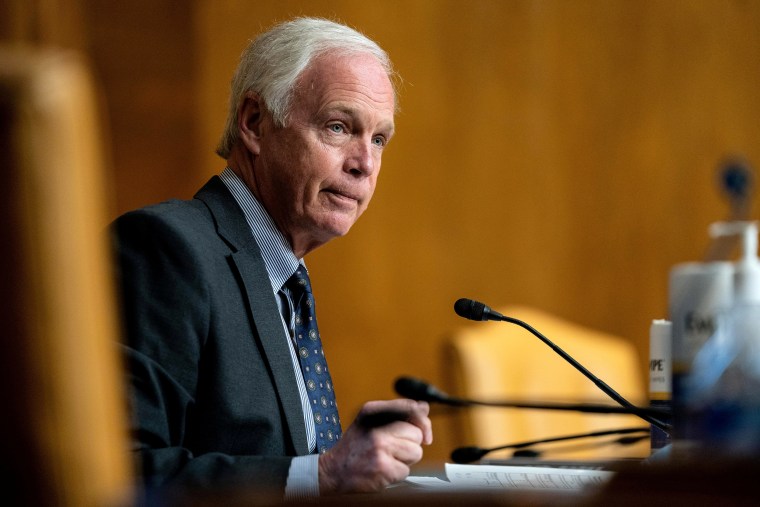On his Fox News program last week, Tucker Carlson suggested COVID vaccines may be linked to a "not even close to normal" number of deaths. The host relied on data from the Vaccine Adverse Event Reporting System (VAERS), and said the statistics painted "a stunning picture."
They did not. A Washington Post analysis characterized Carlson's rhetoric as "sloppy" and "dangerous," and the observations based on cherry-picked data that were quickly discredited.
And yet, a day after the Fox News broadcast, a prominent Republican senator was pushing an eerily similar line. CNN reported:
Under the guise of "just asking the questions," Republican Sen. Ron Johnson of Wisconsin spread anti-vaccine misinformation on a right-wing radio show Thursday, questioning why efforts were being made to vaccinate the general US population, especially young people and those who had previously been infected with Covid-19. Johnson, who tested positive for coronavirus last fall, said he was "sticking up for people who choose not to get vaccinated."
In the radio interview, the Wisconsin Republican brought up the VAERS system, saying, "We are over 3,000 deaths within 30 days of getting the vaccine. About 40% of those occur on day zero, one or two."
A HuffPost report explained soon after, "As the VAERS website clearly states, the reports it contains have not been verified, and anyone with an internet connection can submit one. It's not new; the CDC has been running it for three decades. But during the coronavirus pandemic, it has become a weapon for conspiracy theorists and anti-vaccination activists who use the numbers found there to spread misinformation about vaccines."
A spokesperson for Johnson told CNN the senator was "not suggesting the deaths were directly caused by the COVID-19 vaccine." That's a nice clarification, but even Johnson must've realized how his comments would be received by the public. In the context of a discussion about vaccinations, the GOP lawmaker brought up misinformation popular in anti-vaccine circles, and told a public audience about a possible connection between deaths and vaccinations.
It's the kind of nonsense that undermines public health and puts people in danger for no reason.
Making matters worse, it's part of a pattern from Ron Johnson, whom Republicans put in charge of the Senate committee responsible for domestic security for six long years.
Circling back to our earlier coverage, it was just two weeks ago when the senator also appeared on a Wisconsin radio show to insist the COVID vaccine is "not a fully approved vaccine"; he's "getting highly suspicious" of the "big push to make sure everybody gets the vaccine"; there's "no reason" to encourage Americans to get vaccinated; and he has "doubts" in response to White House requests that the public should "trust the government."
The problem is not just that the senator's rhetoric is foolish -- though it is -- it's also the risks associated with his irresponsible nonsense. There were likely unvaccinated people who heard this radio interview and were persuaded not to get the shot because they heard Johnson's ridiculous, dangerous rhetoric.
Alas, this isn't new. As regular readers may recall, in mid-March 2020, as the scope of the coronavirus crisis was just coming into view, the Wisconsin Republican went further than most in downplaying the importance of mitigation efforts. As part of his case, the senator told the Milwaukee Journal Sentinel, "[W]e don't shut down our economy because tens of thousands of people die on the highways. It's a risk we accept so we can move about." This was a tragically bad argument, for reasons he didn't seem to fully grasp.
A couple of months later, Johnson was seen on the Senate floor without any facial covering. "I wear a mask when I go into grocery stores, that type of thing," the GOP senator said. "I think around here, we probably won't have to." This, too, was wrong.
In July 2020, Johnson argued that the United States "overreacted" in response to the coronavirus pandemic, which was unfortunate at the time, and which is a perspective that looks much worse now, as the death toll passes 580,000 Americans.
In late 2020, Johnson sunk lower, holding multiple Senate hearings to promote pseudo-science and conspiracy theories. Dr. Ashish Jha, dean at Brown University School of Public Health, appeared as a witness at one of the Senate hearings and was amazed by the Wisconsin senator's apparent suspicion that there's a "coordinated effort by America's doctors" to deny patients hydroxychloroquine because of a corrupt scheme involving physicians and the pharmaceutical industry.
All of this, of course, is unrelated to Johnson's ugly rhetoric about immigration and efforts to "remake the demographics of America," his efforts to downplay the deadly Jan. 6 attack on the U.S. Capitol, and his ridiculous conspiracy theories related to the 2020 presidential election -- including his indifference to an FBI warning that he was "a target of Russian disinformation" during the last election cycle.
The far-right senator's second term ends next year. He has not yet said whether he'll ignore his earlier term-limits pledge and run for re-election. In the meantime, if there's a competition among Senate Republicans to see who can be the most irresponsible about the pandemic, Ron Johnson appears to be in the lead.
